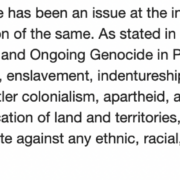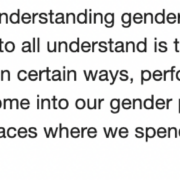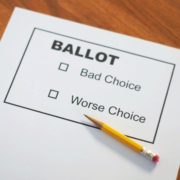It should not be surprising at this point. Another week, another idiotic statement in response to the call for the criminalization of marital rape. This week, when asked about movement on the marital rape bill, the prime minister made a number of disturbing comments.
First, he said, “Drafts are given for consideration. So we have a draft that has been given for our consideration. We have not gotten around to it yet.”
The bill to amend the Sexual Offenses Act to criminalize marital rape has been in draft form since, if not before, 2022. We have had the bill for at least two years. This comes after four years of sitting on an inadequate bill drafted by the previous administration. This is not a new issue, and there are no new items for consideration. There is nothing complicated to think about or discuss. Just last week, he stated that rape is rape, and that he has difficulty with categories and descriptions of rape. The marital rape bill removes a category and ensures that rape that is perpetrated by a spouse is legally treated as rape, as it should.
Next, he said, “As you would recall, I am guided by my ‘Blueprint for Change’. That sets out the basis for which I asked people to vote for me and marital rape was not contained in that. I’m not insensitive to it. I appreciate it and I know.” The Blueprint for Change mentions women only twice. On page 49, it states, “The PLP is committed to the United Nation’s Sustainable Development Goals that ensures quality education, life long learning opportunities, gender equality and empowerment for women and girls; quality water, sanitation, and access to affordable, reliable, sustainable and modern energy.”
The Sustainable Development Goals were adopted by the United Nations General Assembly in September 2015 with full support from all Member States, including The Bahamas. All of the 17 goals have targets, and those targets have indicators that facilitate monitoring and evaluation of progress toward the goals.
Sustainable Development Goal 5, referenced in the Blueprint for Change, is to achieve gender equality and empower all women and girls. The first target is “End all forms of discrimination against all women and girls everywhere.” The indicator for this target is “Whether or not legal frameworks are in place to promote, enforce and monitor equality and non‑discrimination on the basis of sex.” The second target is “Eliminate all forms of violence against all women and girls in the public and private spheres, including trafficking and sexual and other types of exploitation. The indicators of this target are “Proportion of ever-partnered women and girls aged 15 years and older subjected to physical, sexual or psychological violence by a current or former intimate partner in the previous 12 months, by form of violence and by age” and “Proportion of women and girls aged 15 years and older subjected to sexual violence by persons other than an intimate partner in the previous 12 months, by age and place of occurrence.”
Gender equality requires an end to gender-based discrimination in law, policy, and practice. This, combined with the Convention on the Elimination of All Forms of Discrimination against Women (CEDAW) and the recommendations made by the Committee, led to the government engaging UN Women to undertake a review of all laws to identify those that discriminate against women and girls. This is what led to the discriminatory law review forum where the draft was, in a less than ideal way, discussed. The final report has not yet been delivered and approved, but we know the laws that were identified. The Sexual Offenses Act was one of them and Section 3, which defines rape, was specifically identified as one that needs to be amended. Eliminating discrimination against women, which is required to achieve gender equality, necessitates the criminalization of marital rape. The Blueprint for Change, then, includes a commitment to criminalizing marital rape.
On page 52, the Blueprint for Change states, “The Progressive Liberal Party is committed to eliminating all forms of discrimination against men and women in The Bahamas.”
The Bahamas ratified the Convention on the Elimination of All Forms of Discrimination against Women (CEDAW) in 1993. In 2018, it underwent its sixth periodic review. Marital rape was raised, again, raised as a pressing issue. In its Concluding Observations, the CEDAW Committee recommended that the Government of The Bahamas “Adopt, without delay, the amendments to the Sexual Offences Act expressly criminalizing marital rape, remove any temporal limitations to the right to file a complaint for marital rape in the draft amendment to the Sexual Offences Act and establish a sex offender register and registry.”
In her report following her visit to The Bahamas, the (then) Special Rapporteur on Violence Against Women called on the Government of The Bahamas to “Revise or adopt new criminal law provisions to prohibit marital rape, including by ensuring that the definition of sexual crimes, including marital and acquaintance/date rape is based on the lack of freely given consent, and takes account of coercive circumstances, in line with general recommendation No. 35 of the Committee on the Elimination of Discrimination against Women.”
These recommendations are connected to the aforementioned parts of the Blueprint for Change. Criminalizing marital rape is required to follow through on the commitment to the Sustainable Development Goals which include gender equality and to eliminate discrimination against men and women. We must not accept what the Prime Minister has said. This is the work that is required of his administration, and this is the work that is committed to carrying out in its own campaign document.
Finally, the prime minister said, “My thing is that any time a couple … in blissful marriage reaches a stage where they are going to report their husband for rape, it seems to me that that marriage is irretrievably broken, meaning they are no longer married even though it may not have been so pronounced by a court.”
The marriage is broken? Violence is destructive. Sexual violence destructive. Rape is destructive. The conversation about marital rape, contrary to popular belief, is not about marriage. It is about people. Specifically, it is about a person who is violated in a devastating, irreparable way by a perpetrator who is not only known to them, but in a legal arrangement that is supposedly rooted in love, but often turns out to be obsession and/or possession. At present, the law suggests that legal arrangement erases the humanity of the person who has been violated, and that they should endure that violence and have no legal recourse.
Here comes the prime minister. He says the rape means the marriage is broken, such that they are no longer married, regardless of what the law or courts say. This shifted the line of questioning to divorce. It must be made clear that divorce is not a remedy for rape. Whether the marriage is broken or a person in the marriage fails to see the other person as a human being with human rights, including the right to give and withhold consent, divorce should be readily available. It should be more than possible. It should be easy because those people should not be together and should not be forced, by the law, to operate, in any way, as a married people. The violent act of rape, however, requires different action. Any person who is raped must be able to report the rape and have access to justice. Divorce and rape charges are not the same, they are not interchangeable, and one does not replace the other. We need access to both. Everyone should be able to report acts of violence against them, have their reports taken, and see the justice system work for them.
In December 2017, the prime minister said, “I think we all accept…I know no right thinking Bahamian will accept that a person should be violated or in any form or fashion be abused.”
In February 2022, he said, “I’ve given the attorney general the mandate to follow the recommendations that will flow from that conference[…] and we’ll see what the recommendations are from there, and we’ll move to enact what laws [are] recommended by them to the attorney general that is deemed appropriate by the Cabinet.”
In October 2022, he said, “Any assault on a woman, be it whether you call it rape, grievous harm or otherwise, the law should take its course. Report those incidents to the police.”
Help women who raped by their husbands to report those incident to the police. Make rape a crime, regardless of the relationship between the perpetrator and the victim or survivor. Commitments have already been made. The bill has already been drafted. Stand in the shoes you so desperately wanted to wear. Do what you claimed, in your Blueprint for Change, you would do. Move toward the achievement of Sustainable Development Goal 5 for gender equality and eliminate discrimination against women. Criminalize marital rape.
Recommendations
Yesterday was World Book Day, and Equality Bahamas shared a list of recommended books. One set of books were selected from the Feminist Book Club reads, and one set were written by Palestinian authors. Here are four books to consider buying or borrowing to read this month.
How to Say Babylon by Safiya Sinclair
National Book Critics Circle Award Winner, a New York Times Notable Book, and winner of the 2024 OCM Bocas Prize for Fiction winner, this book is hard to put down. From the first page, Sinclair captures readers with the vivid depiction of her childhood and family life and her determination to get out and create a different life for herself.
Evil Eye by Etaf Rum
Yara got married to break free from her conservative family. She went to university, got a job, and wants to teach full time. Her ability to participate in the work culture, which seems inextricably linked with upward mobility, is constrained by her domestic and care responsibilities. It does not help that colleagues obviously buy into stereotypes about Palestinian people, and this flattens her view of her own life into obligation and regret. She wants to prove that she isn’t the stereotypical Palestinian woman, and she wants to challenge, carefully, the norms that have been created in her own family so that she does not become her mother.
What My Bones Know by Stephanie Foo
This is one of those books that, once you have read it, you are bound to think everyone should read. It is memoir infused with research, bringing scientific context to the deeply personal story Foo shared. Foo survived a childhood rife with abuse and abandonment. Though it took a long time, she got the diagnosis of complex post traumatic stress disorder (C-PTSD) and soon realized that she could not just “rally” and move on. She put in significant work to understand the diagnosis and access the care she needed. The story is difficult in parts, yet full of hope.
You Exist Too Much by Zaina Arafat
A queer Palestinian-American girl is trying to be and love herself. This book takes us back and forth between the U.S. to the Middle East, showing different parts of her life. She struggles to live in a space between cultures and beliefs, trying to keep her identity and sense of self stable and strong. What happens when a mother tells her girl child, “You exist too much?” She has to reject it. She has to accept herself.










Leave a Reply
Want to join the discussion?Feel free to contribute!